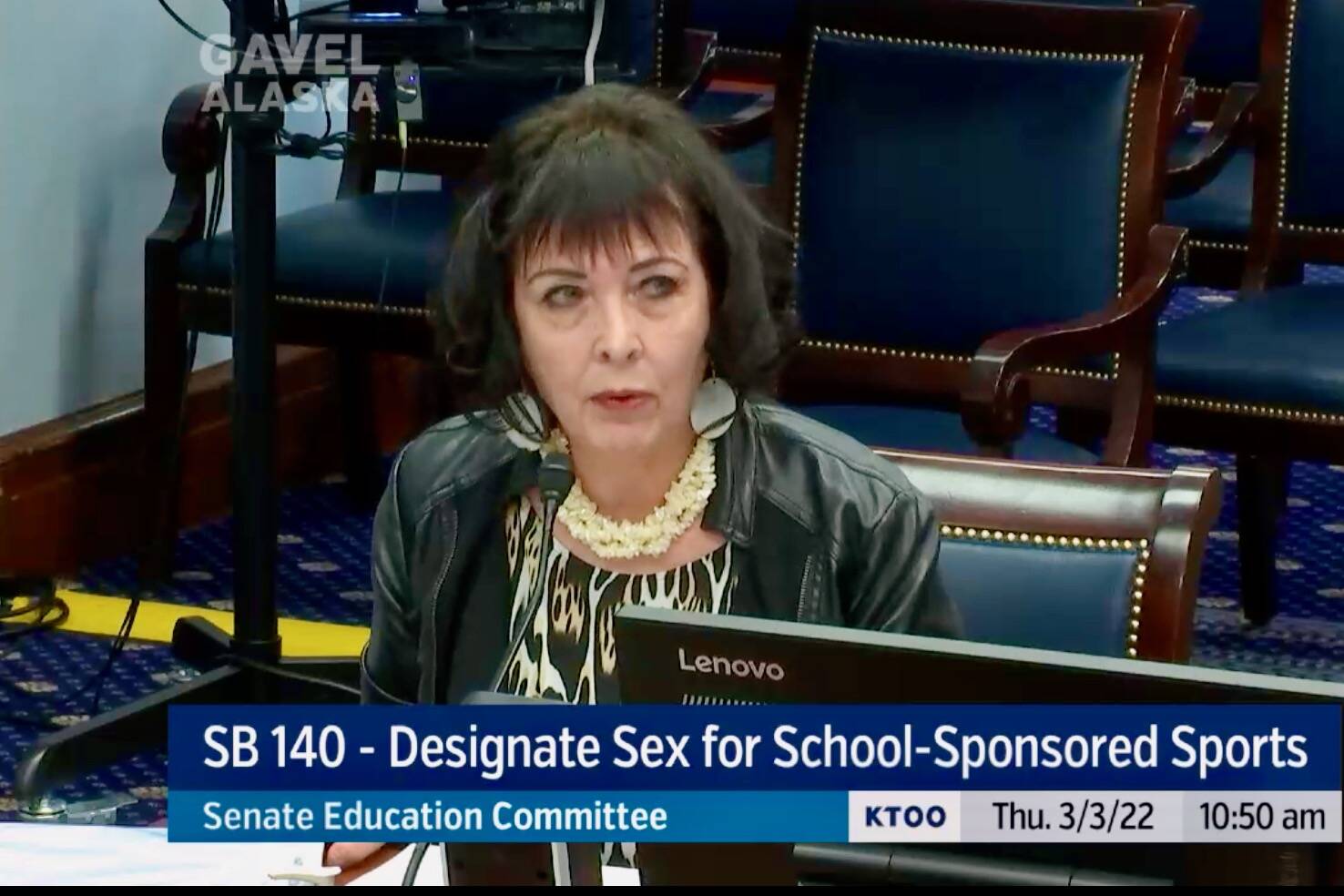The Senate Education Committee on Thursday heard a bill seeking to ban transgender athletes from competing on teams of the sex they identify with.
Senate Bill 140 — introduced by Sen. Shelley Hughes, R-Palmer — would require public or private schools that compete against a public school to have their sports teams designated as male, female or coeducational and use biological sex as a determining factor.
Speaking to the committee, Hughes said allowing transgender athletes to compete as their identified sex violated Title IX protections by discriminating against biological women for team selection, championships and college scholarships.
Hughes said a number of Alaskans have approached her asking she carry the legislation, known as the Even Playing Field Act.
“Undeniable evidence and scientific research conclude that the average biological male body is stronger, larger and faster than the average female body even after testosterone suppression treatment,” Hughes said. “Male-bodied athletes have a substantial physical advantage over female athletes in sports, regardless of the beliefs that the male-bodied athlete may hold about their sexuality or gender identity.”
All of Thursday’s invited testimony spoke in favor of the bill, and the committee meeting ended before lawmakers could put questions to testifiers.
At the end of the meeting Senate Minority Leader Tom Begich, D-Anchorage, said the proposed legislation was blatantly unconstitutional and that similar bills in other states had either been struck down in court or are in the process of litigation.
“I just want to be sure that we understand that there is another side to this story,” Begich said.
In an interview with the Empire, Begich said the legislation wouldn’t hold up in court, saying it violated students’ right to privacy.
“The invasive notion that you would be able to go in and examine a student will be struck down in Alaska court,” Begich said.
A memo from Legislative Legal Services requested by Begich flagged several potential conflicts in the bill that might violate the state’s constitution in several ways.
“The Alaska Supreme Court has stated on more than one occasion that the Alaska Constitution affords broader protections than does the federal constitution,” the memo said. “A student will have to reveal the student’s biological sex in order to participate in sports. Facts surrounding a person’s biological sex can be intensely private. As the Alaska Supreme Court has stated, ‘few things (are) more personal than one’s body.’”
The bill also provides legal grounds for students or schools to sue for damages if they are deprived of an athletic opportunity or suffer direct or indirect damages resulting from a violation of the law.
In over an hour of testimony, the committee heard from athletes, lawyers and sports professionals who said the physical advantages of biological men should preclude them from competing against biological women. One of the testifiers was professional track athlete Cynthia Monteleone, who said she had competed against male-bodied athletes and won by only tenths of a second, and as a coach has seen girls demoralized when competing against biological males.
[House leadership proposes $1,300 ‘energy relief check’]
“But how can you win as a female when you’re lined up next to a male body whose strength, heart and lung capacity, and pace are all greater than your own no matter what the treatment,” Monteleone said.
Throughout the presentation, Hughes and other testifiers said the bill was not anti-transgender, and affirmed their support for transgender people.
“I’m a concerned trans woman who feels that something needs to be done to preserve fairness in women’s sports,” said Alary Woods of Kentucky, who was asked to testify. “I believe doing so will help preserve the integrity of the trans community with respect to our relationships with all women.”
Hughes and others suggested that allowing biological males to compete in women’s sports would eventually lead to the complete erosion of women’s sports. Hughes pointed to the case of the University of Pennsylvania swimmer Lia Thomas, who has set several college records in women’s swimming after transitioning in 2019. The Washington Post reported 16 of Thomas’s teammates penned an anonymous letter saying she had an unfair advantage and was taking away opportunities for biological women.
“Coaches are hired to take teams to victory,” Hughes said. “Rosters will eventually fill up with male-bodied athletes.”
At the top of the meeting Education Committee Chair Sen. Roger Holland, R-Anchorage, said lawmakers have received a high volume of emails regarding the legislation and said the committee would take its time on the bill. Holland said public testimony was being rescheduled, and would likely take place in two weeks on a Saturday to allow more opportunity for commenters.
Similar legislation has gained traction in other states.
Also Thursday, The Associated Press reported Iowa Gov. Kim Reynolds, a Republican, signed a bill into law that prohibits transgender females from participating in girls high school and college sports. Iowa’s Legislative Services Agency told lawmakers the state could lose federal funds if authorities find the law is violating federal civil rights laws, AP reported.
• Contact reporter Peter Segall at psegall@juneauempire.com. Follow him on Twitter at @SegallJnuEmpire.

